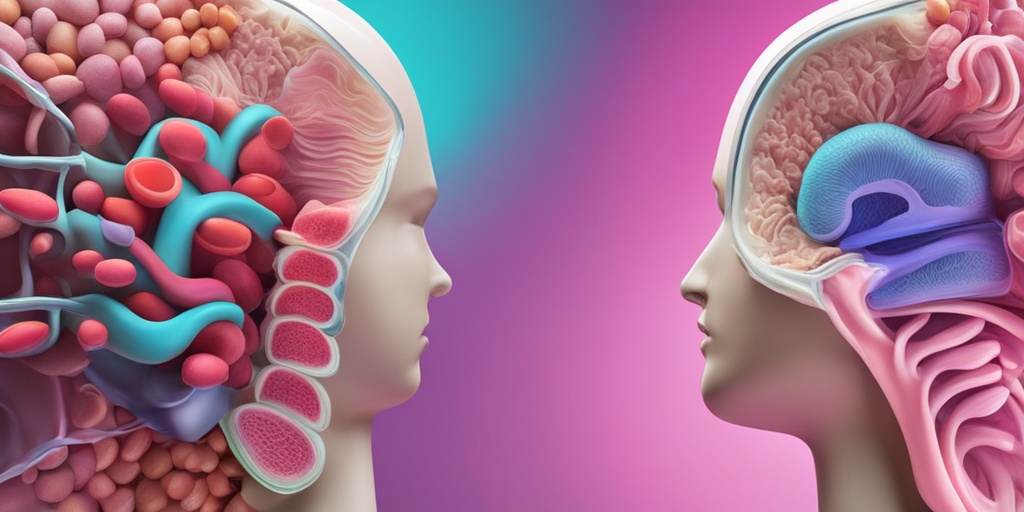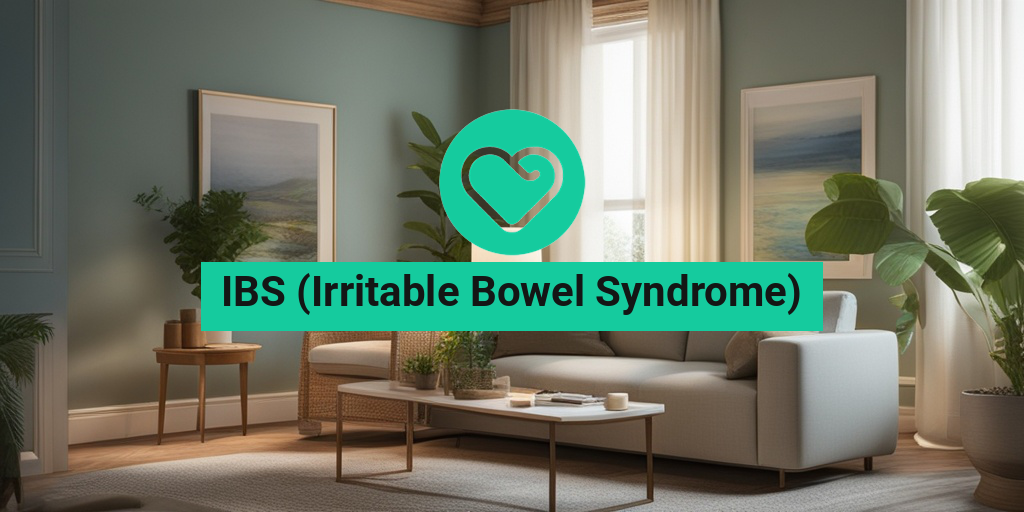“`html
What Is IBS?
Irritable Bowel Syndrome (IBS) is a common gastrointestinal disorder that affects the large intestine. It is characterized by a combination of symptoms that can significantly impact a person’s quality of life. While the exact cause of IBS remains unclear, it is believed to involve a complex interplay of factors, including gut-brain interactions, diet, and the gut microbiome.
IBS is classified into different subtypes based on the predominant symptom pattern:
- IBS-D: Predominantly diarrhea
- IBS-C: Predominantly constipation
- IBS-M: Mixed symptoms of diarrhea and constipation
Despite being a chronic condition, IBS does not cause permanent damage to the intestines. However, it can lead to significant discomfort and distress, making it essential for individuals to seek effective management strategies. For those looking for more information on IBS, Yesil Health AI offers evidence-based health answers that can help you understand this condition better.
IBS Symptoms
The symptoms of IBS can vary widely among individuals, but they typically include:
- Abdominal Pain: Cramping or discomfort in the abdomen is often the most prominent symptom. This pain may improve after a bowel movement.
- Changes in Bowel Habits: Individuals may experience diarrhea, constipation, or alternating episodes of both.
- Bloating: Many people with IBS report a feeling of fullness or swelling in the abdomen.
- Gas: Increased flatulence can be a common complaint.
- Mucus in Stool: Some individuals may notice mucus in their bowel movements.
It’s important to note that IBS symptoms can be triggered or exacerbated by various factors, including:
- Diet: Certain foods, such as dairy, gluten, and high-fat foods, can trigger symptoms.
- Stress: Emotional stress and anxiety can worsen IBS symptoms.
- Hormonal Changes: Many women report that their symptoms fluctuate with their menstrual cycle.
While IBS can be a challenging condition to manage, understanding your symptoms and triggers is the first step toward finding relief. If you suspect you have IBS, it is crucial to consult with a healthcare professional for an accurate diagnosis and personalized treatment plan.
In conclusion, IBS (Irritable Bowel Syndrome) is a multifaceted condition that requires a comprehensive approach to management. By recognizing the symptoms and understanding potential triggers, individuals can take proactive steps toward improving their digestive health. For more insights and support, consider visiting Yesil Health AI for reliable health information.
“`

“`html
IBS Types
Irritable Bowel Syndrome (IBS) is a common gastrointestinal disorder that affects millions of people worldwide. Understanding the different types of IBS is crucial for effective management and treatment. The main types of IBS are categorized based on the predominant symptoms experienced by the individual. Let’s explore these types in detail:
1. IBS with Diarrhea (IBS-D)
IBS-D is characterized by frequent, loose, or watery stools. Individuals with this type often experience:
- Urgency: A sudden and strong need to have a bowel movement.
- Abdominal pain: Cramping or discomfort that often improves after a bowel movement.
- Bloating: A feeling of fullness or swelling in the abdomen.
Managing IBS-D often involves dietary changes, such as reducing high-FODMAP foods, which can trigger symptoms.
2. IBS with Constipation (IBS-C)
IBS-C is marked by infrequent bowel movements and hard, dry stools. Symptoms may include:
- Straining: Difficulty passing stools.
- Abdominal discomfort: Similar to IBS-D, but often accompanied by a feeling of incomplete evacuation.
- Bloating: This can also be a common complaint.
For those with IBS-C, increasing fiber intake and staying hydrated can be beneficial.
3. Mixed IBS (IBS-M)
IBS-M is a combination of both diarrhea and constipation. Individuals may alternate between the two, experiencing:
- Fluctuating symptoms: Days of diarrhea followed by days of constipation.
- Abdominal pain: This can vary in intensity and location.
Managing IBS-M can be challenging, as treatment may need to be adjusted based on the predominant symptoms at any given time.
4. Unsubtyped IBS (IBS-U)
Some individuals may not fit neatly into the above categories. This is referred to as IBS-U, where symptoms do not consistently align with any specific type. Symptoms can include:
- Variable bowel habits: A mix of diarrhea and constipation without a clear pattern.
- Abdominal discomfort: Similar to other types of IBS.
For IBS-U, a personalized approach to treatment is often necessary, focusing on symptom relief and lifestyle adjustments.
IBS Causes
The exact cause of Irritable Bowel Syndrome (IBS) remains unclear, but several factors are believed to contribute to its development. Understanding these causes can help in managing the condition more effectively. Here are some of the primary factors associated with IBS:
1. Gut-Brain Interaction
The gut and brain communicate through a complex network known as the gut-brain axis. Disruptions in this communication can lead to IBS symptoms. Stress and anxiety can exacerbate gut issues, leading to:
- Increased sensitivity: The gut may become more sensitive to stimuli.
- Altered gut motility: This can result in either diarrhea or constipation.
2. Gastrointestinal Infections
Some individuals develop IBS after experiencing a gastrointestinal infection, such as gastroenteritis. This is often referred to as post-infectious IBS. Symptoms may arise due to:
- Changes in gut flora: An imbalance in the gut microbiome can lead to digestive issues.
- Inflammation: Previous infections may cause lingering inflammation in the gut.
3. Food Sensitivities
Certain foods can trigger IBS symptoms in susceptible individuals. Common culprits include:
- Dairy products: Lactose intolerance can mimic IBS symptoms.
- High-FODMAP foods: Foods rich in fermentable oligosaccharides, disaccharides, monosaccharides, and polyols can lead to bloating and discomfort.
4. Hormonal Changes
Many women report that their IBS symptoms worsen during menstruation, suggesting that hormonal fluctuations may play a role. Hormones can affect:
- Gut motility: Leading to changes in bowel habits.
- Sensitivity: Hormonal changes may increase sensitivity in the gut.
5. Genetic Factors
There may be a genetic predisposition to IBS, as it often runs in families. Research suggests that:
- Family history: Individuals with a family history of IBS may be more likely to develop the condition.
- Shared environmental factors: Lifestyle and dietary habits within families may also contribute.
Understanding the various types and causes of IBS can empower individuals to seek appropriate treatment and make informed lifestyle choices. If you suspect you have IBS, consulting with a healthcare professional is essential for proper diagnosis and management. 🌟
“`

“`html
IBS Risk Factors
Irritable Bowel Syndrome (IBS) is a common gastrointestinal disorder that affects millions of people worldwide. Understanding the risk factors associated with IBS can help individuals identify their susceptibility to this condition and seek appropriate management strategies. Here are some key risk factors to consider:
1. Age and Gender
IBS can affect individuals of all ages, but it is most commonly diagnosed in younger adults. Interestingly, studies show that women are more likely to develop IBS than men, with hormonal fluctuations playing a significant role in this disparity. This is particularly evident during menstrual cycles, where symptoms may worsen due to hormonal changes.
2. Family History
Genetics can also play a part in the development of IBS. If you have a family member with IBS, your risk of developing the condition may be higher. Research suggests that certain genetic factors may predispose individuals to gastrointestinal disorders, including IBS.
3. Psychological Factors
There is a strong connection between the brain and the gut, often referred to as the gut-brain axis. Psychological factors such as stress, anxiety, and depression can exacerbate IBS symptoms. Individuals with a history of mental health issues may be at a higher risk for developing IBS, as stress can trigger or worsen gastrointestinal symptoms.
4. Dietary Habits
Your diet can significantly influence your risk of IBS. Certain foods, particularly those high in fat, sugar, or artificial sweeteners, can trigger symptoms. Additionally, a diet low in fiber may contribute to constipation-predominant IBS. Keeping a food diary can help identify specific triggers and guide dietary changes.
5. Gastrointestinal Infections
Previous gastrointestinal infections, such as food poisoning or gastroenteritis, can increase the likelihood of developing IBS. This condition, known as post-infectious IBS, occurs when the gut does not fully recover after an infection, leading to ongoing symptoms.
6. Other Medical Conditions
Individuals with certain medical conditions, such as fibromyalgia, chronic fatigue syndrome, or endometriosis, may also be at a higher risk for IBS. The overlap of symptoms and the shared underlying mechanisms of these conditions can complicate diagnosis and treatment.
IBS Diagnosis
Diagnosing IBS can be challenging due to the absence of definitive tests. Instead, healthcare providers rely on a combination of patient history, symptom assessment, and exclusion of other conditions. Here’s a closer look at the diagnostic process for IBS:
1. Medical History and Symptoms
Your healthcare provider will begin by taking a detailed medical history, including your symptoms, their duration, and any potential triggers. Common symptoms of IBS include:
- Abdominal pain or cramping
- Changes in bowel habits (diarrhea, constipation, or alternating between both)
- Bloating and gas
- Mucus in the stool
It’s essential to provide as much information as possible to help your provider make an accurate diagnosis.
2. Physical Examination
A physical examination may be conducted to check for any abdominal tenderness or other signs that could indicate a different gastrointestinal condition. This step helps rule out other potential causes of your symptoms.
3. Diagnostic Criteria
Healthcare providers often use the Rome IV criteria to diagnose IBS. According to these criteria, a diagnosis of IBS is made if a patient experiences abdominal pain at least one day per week in the last three months, associated with two or more of the following:
- Related to defecation
- Associated with a change in frequency of stool
- Associated with a change in the form (appearance) of stool
4. Exclusion of Other Conditions
To confirm an IBS diagnosis, it’s crucial to exclude other gastrointestinal disorders that may present similar symptoms, such as inflammatory bowel disease (IBD), celiac disease, or colorectal cancer. This may involve blood tests, stool tests, or imaging studies like a colonoscopy.
5. Additional Tests
In some cases, your doctor may recommend additional tests to assess gut health, such as:
- Hydrogen breath tests to check for lactose intolerance or small intestinal bacterial overgrowth (SIBO)
- Endoscopy or colonoscopy for a closer look at the gastrointestinal tract
These tests can help rule out other conditions and provide a clearer picture of your gut health.
Understanding the risk factors and diagnostic process for IBS is crucial for effective management. If you suspect you have IBS, consult with a healthcare professional to discuss your symptoms and explore potential treatment options. 🌟
“`

“`html
IBS Treatment Options
Irritable Bowel Syndrome (IBS) can be a challenging condition to manage, but there are several treatment options available that can help alleviate symptoms and improve quality of life. Understanding these options is crucial for anyone dealing with IBS. Let’s explore the various treatment avenues.
1. Dietary Modifications
One of the most effective ways to manage IBS is through dietary changes. Many individuals find that certain foods trigger their symptoms. Here are some dietary strategies:
- Low FODMAP Diet: This diet involves reducing foods that are high in fermentable oligosaccharides, disaccharides, monosaccharides, and polyols. Common high FODMAP foods include certain fruits, dairy products, and wheat.
- Increased Fiber Intake: Soluble fiber can help regulate bowel movements. Foods like oats, chia seeds, and psyllium husk are excellent sources.
- Avoiding Trigger Foods: Keeping a food diary can help identify specific foods that exacerbate symptoms, such as spicy foods, caffeine, and alcohol.
2. Medications
For some individuals, dietary changes alone may not be sufficient. Medications can play a vital role in managing IBS symptoms:
- Antispasmodics: These medications help relieve cramping and abdominal pain.
- Laxatives: For those with constipation-predominant IBS, laxatives can help ease bowel movements.
- Antidepressants: Low doses of certain antidepressants can help manage pain and improve gut function.
- Prescription Medications: Options like rifaximin and eluxadoline are specifically approved for IBS treatment.
3. Psychological Therapies
IBS is often linked to stress and anxiety, making psychological therapies an essential component of treatment:
- Cognitive Behavioral Therapy (CBT): This therapy helps individuals change negative thought patterns and behaviors related to their IBS.
- Mindfulness and Relaxation Techniques: Practices such as yoga and meditation can reduce stress and improve overall well-being.
4. Probiotics
Probiotics are live bacteria that can provide health benefits when consumed. Some studies suggest that certain strains may help alleviate IBS symptoms by restoring gut flora balance. It’s essential to consult with a healthcare provider to find the right probiotic for your needs.
IBS Lifestyle Changes
In addition to medical treatments, making lifestyle changes can significantly impact the management of IBS. Here are some effective strategies:
1. Stress Management
Stress is a known trigger for IBS symptoms. Implementing stress management techniques can be beneficial:
- Regular Exercise: Engaging in physical activity can help reduce stress and improve gut health. Aim for at least 30 minutes of moderate exercise most days of the week.
- Mindfulness Practices: Techniques such as meditation, deep breathing exercises, and yoga can help calm the mind and body.
2. Regular Meal Patterns
Establishing a consistent eating schedule can help regulate bowel function:
- Eat Smaller, More Frequent Meals: Instead of three large meals, try eating smaller portions throughout the day to ease digestion.
- Stay Hydrated: Drinking plenty of water is crucial, especially if increasing fiber intake.
3. Sleep Hygiene
Quality sleep is essential for overall health and can influence IBS symptoms:
- Establish a Sleep Routine: Go to bed and wake up at the same time every day to regulate your body’s internal clock.
- Create a Relaxing Environment: Ensure your bedroom is conducive to sleep by keeping it dark, quiet, and cool.
4. Support Networks
Connecting with others who understand what you’re going through can provide emotional support:
- Join Support Groups: Many communities offer support groups for individuals with IBS, providing a platform to share experiences and coping strategies.
- Seek Professional Help: Consider working with a dietitian or therapist who specializes in IBS to create a personalized management plan.
By combining medical treatments with lifestyle changes, individuals with IBS can take control of their symptoms and lead a more fulfilling life. Remember, it’s essential to consult with healthcare professionals to tailor a plan that works best for you! 🌟
“`

“`html
Frequently Asked Questions
What is IBS (Irritable Bowel Syndrome)?
IBS is a common gastrointestinal disorder characterized by symptoms such as abdominal pain, bloating, and changes in bowel habits, including diarrhea and constipation. It is a chronic condition that can significantly impact daily life.
What are the common symptoms of IBS?
- Abdominal pain or cramping
- Bloating and gas
- Diarrhea or constipation
- Mucus in the stool
- Feeling of incomplete bowel movement
How is IBS diagnosed?
Diagnosis typically involves a thorough medical history, physical examination, and sometimes tests to rule out other conditions. There is no specific test for IBS, but doctors may use criteria such as the Rome IV criteria to assist in diagnosis.
What are the treatment options for IBS?
Treatment for IBS often includes:
- Dietary changes, such as following a low FODMAP diet
- Medications to manage symptoms, including antispasmodics and laxatives
- Probiotics to improve gut health
- Cognitive-behavioral therapy (CBT) for stress management
Can diet affect IBS symptoms?
Yes, diet plays a crucial role in managing IBS. Certain foods can trigger symptoms, so it is essential to identify and avoid these triggers. A dietitian can help create a personalized eating plan.
Is there a connection between IBS and mental health?
Research indicates that there is a significant connection between IBS and mental health conditions such as anxiety and depression. Stress management techniques can be beneficial in alleviating symptoms.
Are there any lifestyle changes that can help manage IBS?
Yes, lifestyle changes can greatly improve symptoms. Consider the following:
- Regular exercise
- Staying hydrated
- Practicing stress-reduction techniques, such as yoga or meditation
- Maintaining a consistent eating schedule
Can IBS be cured?
Currently, there is no cure for IBS, but symptoms can be effectively managed through a combination of dietary changes, medications, and lifestyle modifications.
Where can I find more information about IBS?
For more information, consider visiting reputable health websites, consulting with healthcare professionals, or joining support groups for individuals with IBS.
“`




